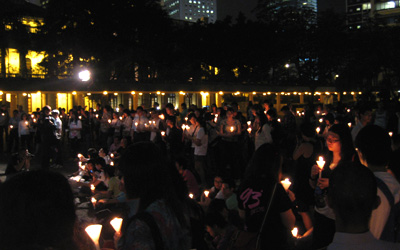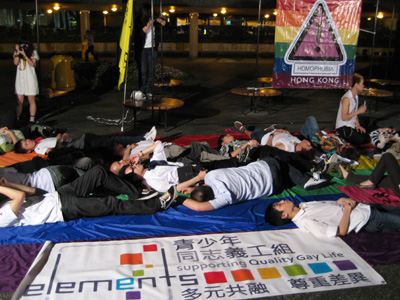Some 200 people joined the International Day Against Homophobia and Transphobia candlelight vigil held at Chater Garden, a public park directly east of the Legislative Council building in the Central District of Hong Kong at 7pm on Monday evening.
After speeches from members of the organising committee, the emcees cited a series of homophobic and transphobic incidents around the world, including the crackdown on the IDAHO march in Minsk, Belarus the Saturday before.
The citing was complemented by a projected slide show prepared by Medeleine Mok of the LGBT Group of Amnesty International Hong Kong. The presentation included gruesome pictures of sexual minorities and suspected sexual minorities being executed by hanging and other means. The presentation struck a chord with many in the audience.

“Although Hong Kong seems pretty conservative, there are countries where things are even more serious, with all the political and religious persecution… why not let people be who they are?” says Annie Chan, a 20-year-old university student who found out about the event through Facebook postings.
To inspire that kind of reflection seemed to be exactly what Mok had in mind when she prepared the slide show.
“The format of a candlelight vigil is good because before, we had mostly protests and they were very confrontational. Here, people come after work, and they have time to sit back and ponder about homophobia and transphobia – how they affect us – and to listen to others’ thoughts,” she said.
After the citing of homophobic and transphobic incidents, a “die-in” exercise was called, where people voluntarily walked on to the rainbow flag laid on the ground to play dead in protest of the atrocities caused by prejudice and discrimination. A piece of white cloth was then draped over them and the rainbow, signifying that diversity had lost its battle, if only for a short while.

Messages of hope followed as candles were being lit. Notable speakers were invited to speak. Dr Fernando Cheung, former legislator and currently chairman of Forthright Caucus said that the problem with Hong Kong culture was a general lack of humanity.
“As a registered social worker, I see Hong Kong as a jungle-like survival-of-the-fittest capitalist environment. People who are unique, special or different are being persecuted,” he says. “But if different minorities can come together they will become the majority.”
Cheung was instrumental in initiating the process that saw the passage of amendments to Hong Kong’s Domestic Violence Ordinance, which now protects same-sex partners from abuse. The legislative proposal sparked debates on whether or not such amendments would indirectly recognise same-sex marriage – a social taboo.
But perhaps the most touching of speeches came from the religious representatives.
“The Christian faith is measured by love, for people who are different from you and people that you don’t know,” Reverend Fung Chi Wood, a former legislator said. He added that homophobia and transphobia were caused by ignorance. “You need to learn about sexual minorities, in flesh and blood, and use your reasoning. The truth will prevail.”
A transgender person, Mo Mo, was also invited to speak. One of the issues she touched on was very close to home.
“Most family members would discourage their transgender children from going for an operation, saying that it’s a difficult path to walk on. Although they say so because of love, what they end up doing is putting more strain on their loved ones,” she said. “Just treat us as we are, our self-identified genders.”
That plea extends to the government as well. University of Hong Kong professor and leading researcher in gender identity diversity Sam Winter pointed out in his speech that when it came to protecting the rights of transgender people, Hong Kong was lagging behind many countries and regions in Asia, including parts of Mainland China.
The sex field on many legal documents in the city such as the birth certificate is unchangeable, leaving transgender people in legal limbo.
“Let’s call on Hong Kong Government to take action to recognise all people’s gender identities, and join so many other countries in making the changes that will truly make possible respect, equality and dignity for transgender people.”
Jimmy Sham of sexual minority group Rainbow of Hong Kong, one of the emcees, was touched by Mo’s speech.
“It’s very rare to have a transgender person willing to speak so publicly. Momo was very reluctant in the beginning, and then she came out and spoke from her heart,” he said. “And the audience listened closely.”
As the event was wrapping up and candles were being extinguished, a question seemed to be hanging in the air: Is it worth continuing these events? The answer was an unequivocal “yes”, at least among the audience.
“If you don’t do anything, you stay where you are. We are still speaking of the issue of visibility here. The event showed that sexual minorities could stand out here and express themselves, despite the pressure,” says another participant Kwan, who also found out about the event online.
Other notable speakers at the events included Cyd Ho Sau-lan, arguably Hong Kong’s most pro-sexual minority legislator; former legislator Dr Lo Wing Lok and Reverend Phyllis Wong, minister of Kowloon Union Church.
For more on the event and the names of organisers and supporters, please visit idahohk.org.
Reggie Ho is the Chairman of Tongzhi Community Joint Meeting (TCJM) and HORIZONS – Hong Kong’s Gay Helpline Service – co-organiser of the IDAHO candlelight vigil.
